In the competitive field of accounting, having a standout resume is essential. Our collection of resume examples for Accountant is designed to guide you in crafting a compelling document that not only showcases your financial expertise but also highlights your unique qualifications. Whether you’re a seasoned professional or just starting out, these examples will provide you with the inspiration needed to impress potential employers and secure your dream job.
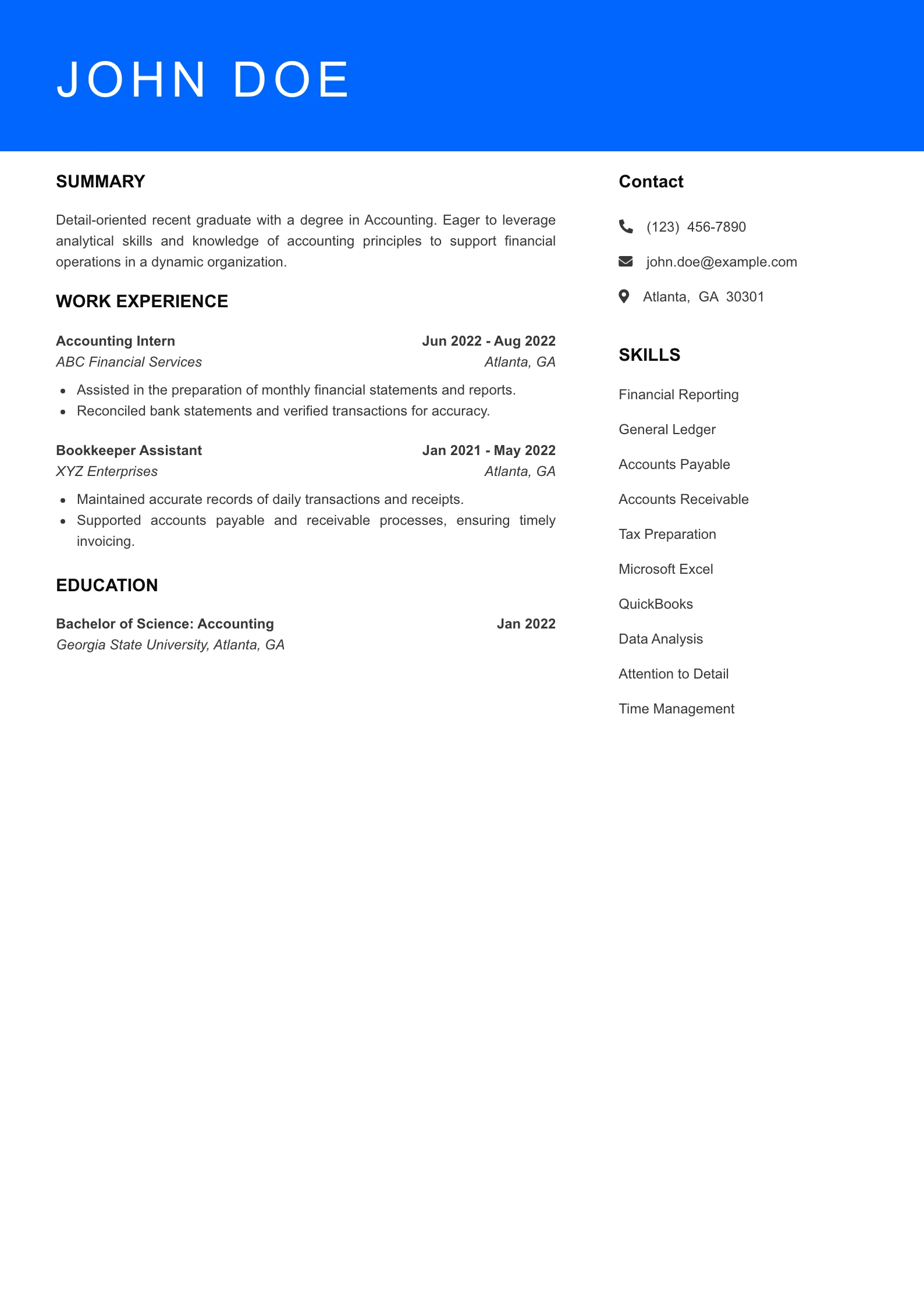

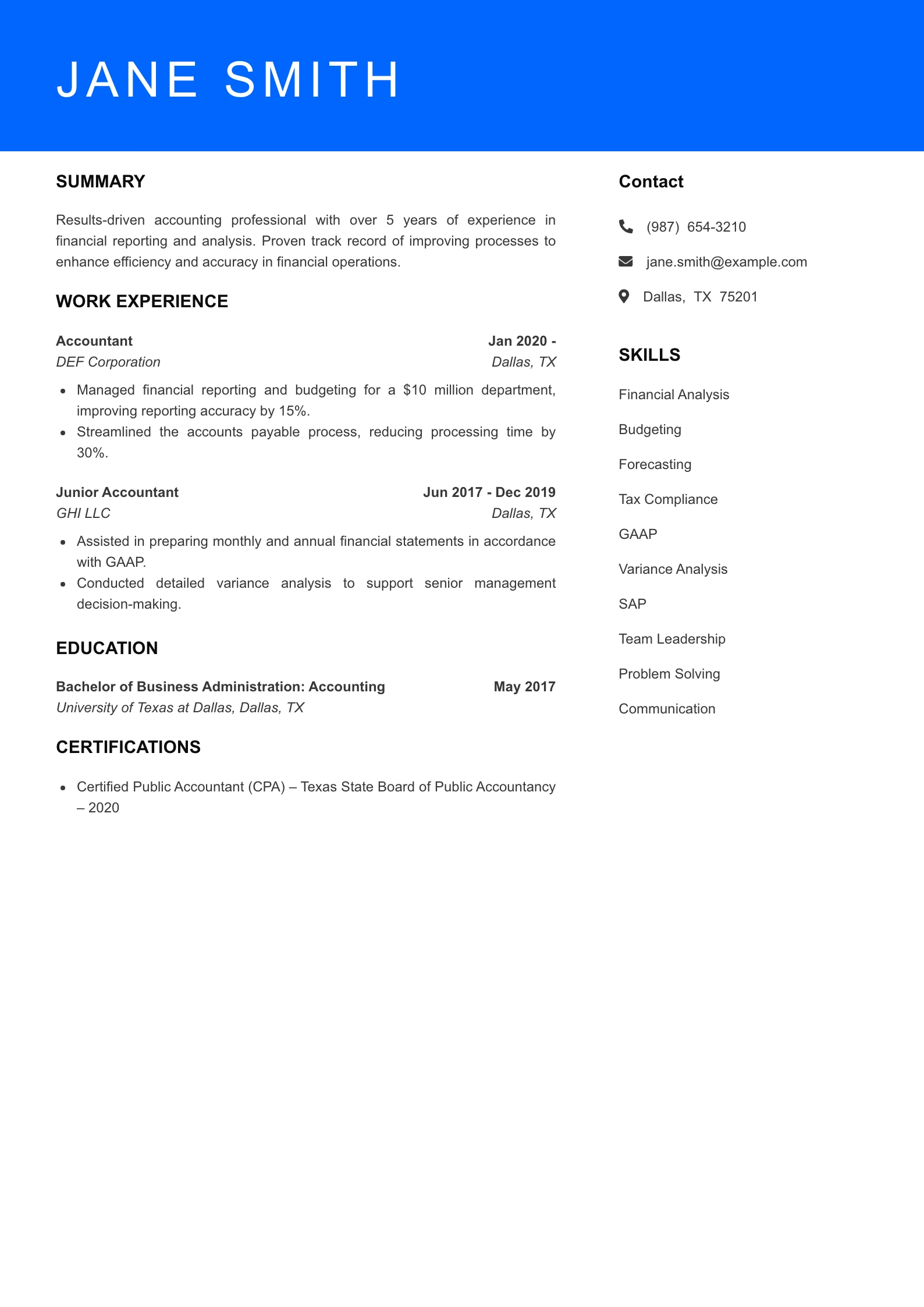
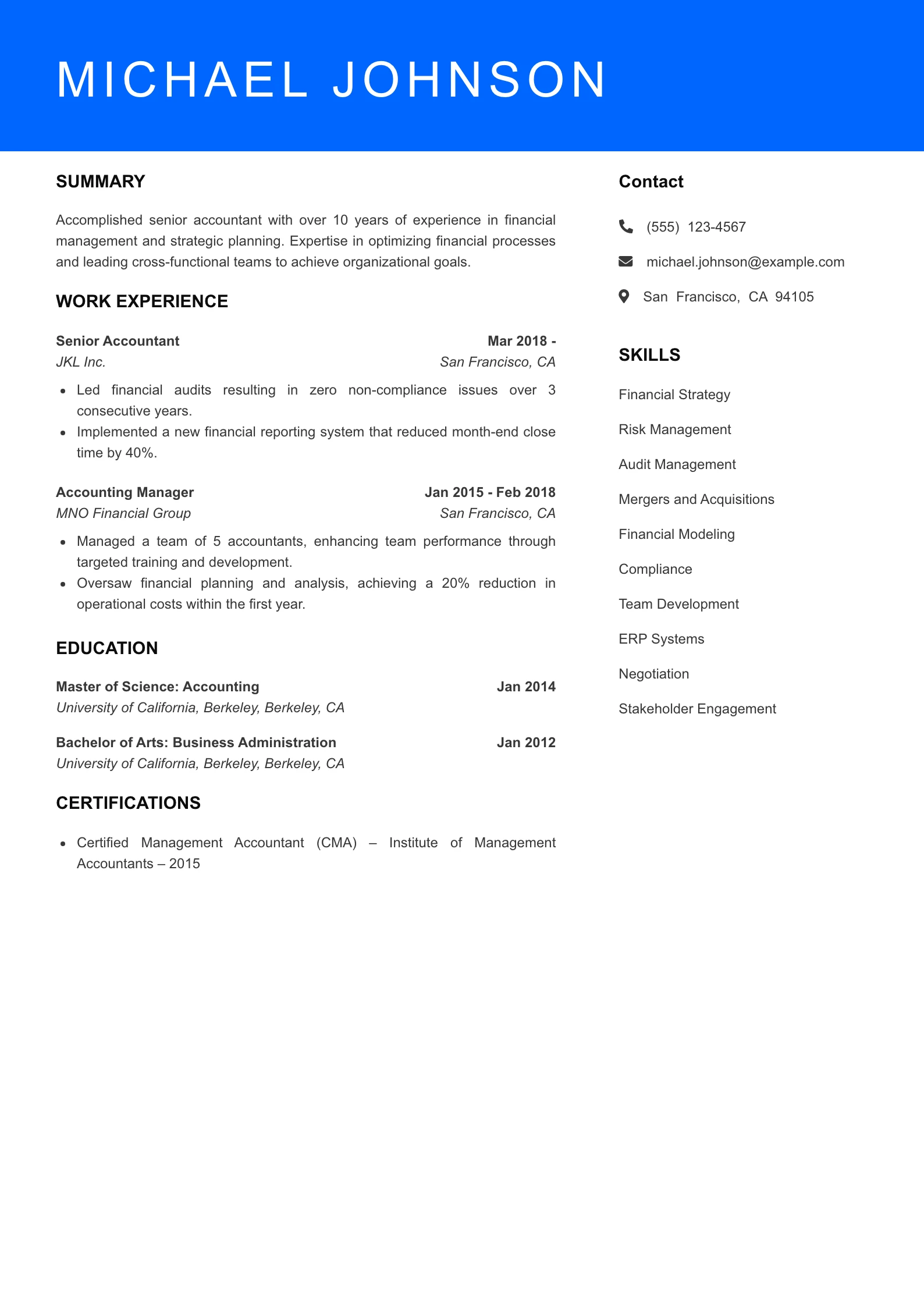
Accountant Resume Examples
Entry Level Accountant Resume Example
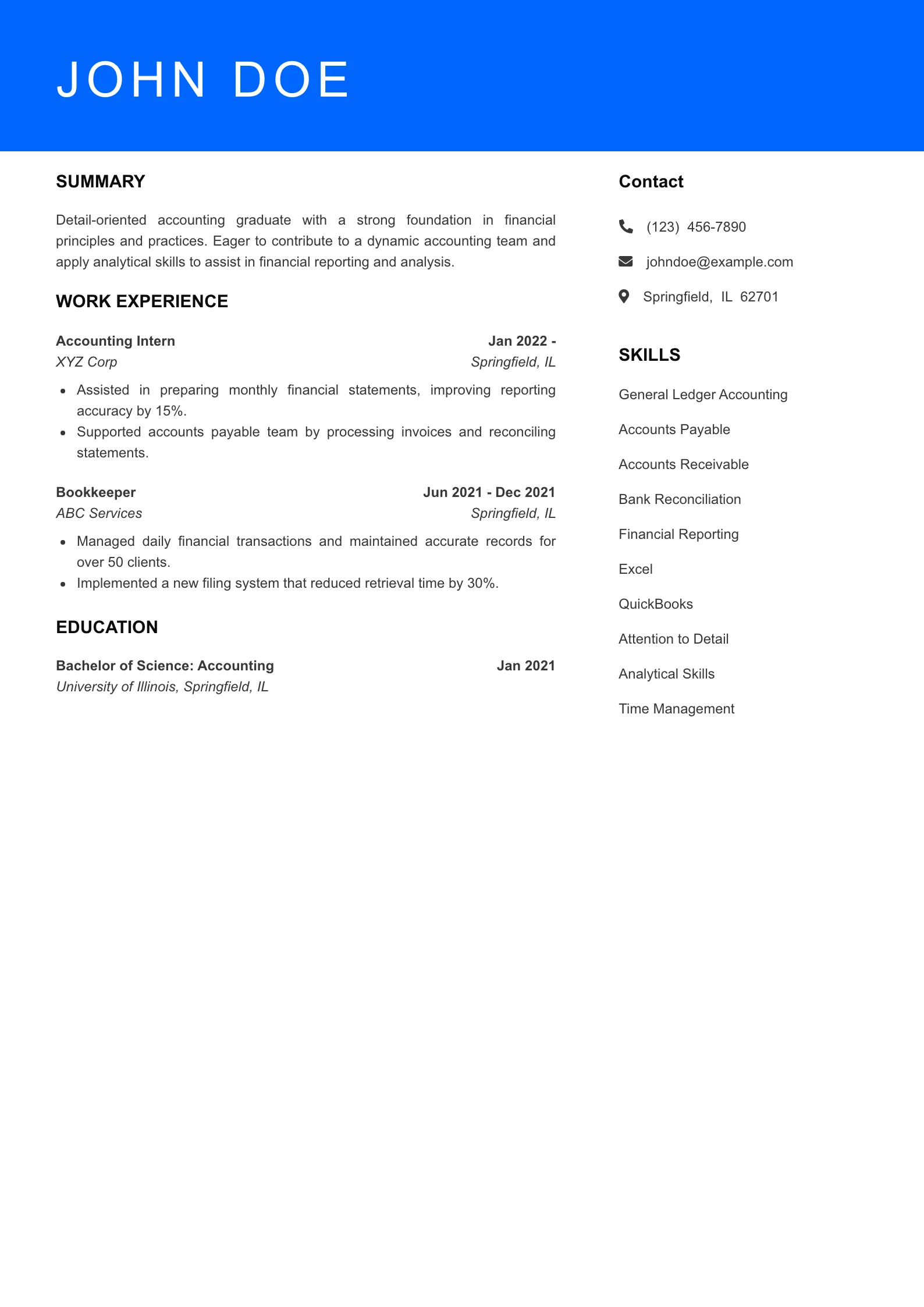
Why This Resume Works
- The summary clearly outlines John Doe’s educational background and eagerness to contribute, positioning him as an entry-level candidate with relevant accounting knowledge.
- The skills section contains a comprehensive list of relevant technical and soft skills that align well with the needs of potential employers in the accounting field.
- The work history includes quantifiable achievements, demonstrating a direct impact on the organizations he worked for, which enhances his appeal as a candidate.
- The roles listed in the work history are appropriate for an entry-level position, showing a progression of responsibilities that indicate readiness for a permanent role in accounting.
- The overall clarity and professional tone of the resume make it easy to read and understand, ensuring that hiring managers can quickly assess his qualifications.
Mid Level Accountant Resume Example
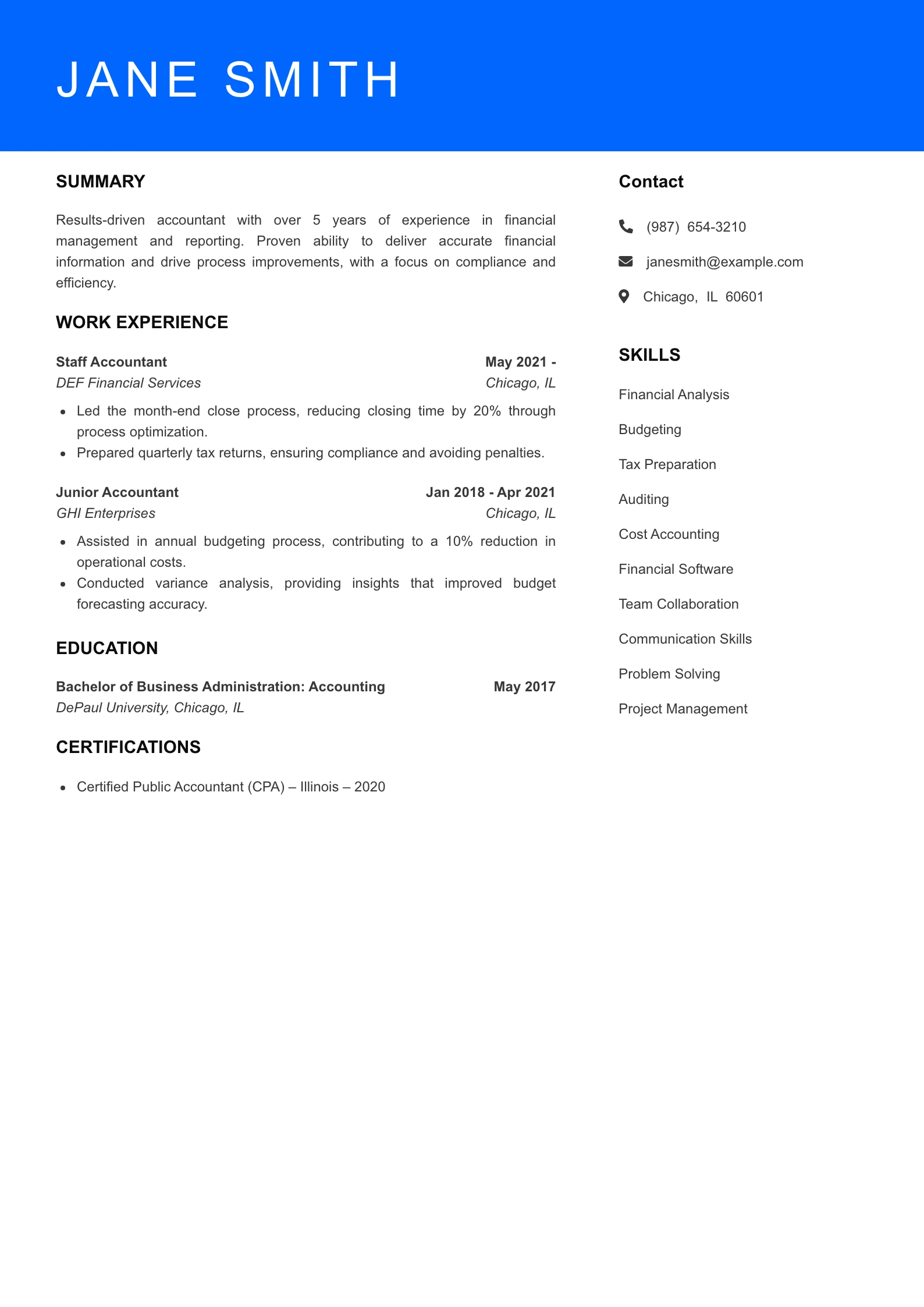
Why This Resume Works
- The summary clearly articulates Jane’s experience and focuses on her results-driven approach, effectively aligning her qualifications with the expectations for a marketing manager role.
- Relevant skills listed, such as financial analysis and project management, demonstrate a strong foundation in both technical and soft skills, making her a versatile candidate for marketing management.
- The work history highlights impactful achievements, such as reducing closing time and operational costs, showcasing her ability to drive process improvements—an essential quality for a management position.
- The resume positions Jane as a mid-level professional with over 5 years of experience, fitting well within the typical requirements for a marketing manager role.
- The clarity and professional tone throughout the resume provide a polished and confident presentation, enhancing her appeal to potential employers.
Senior Level Accountant Resume Example
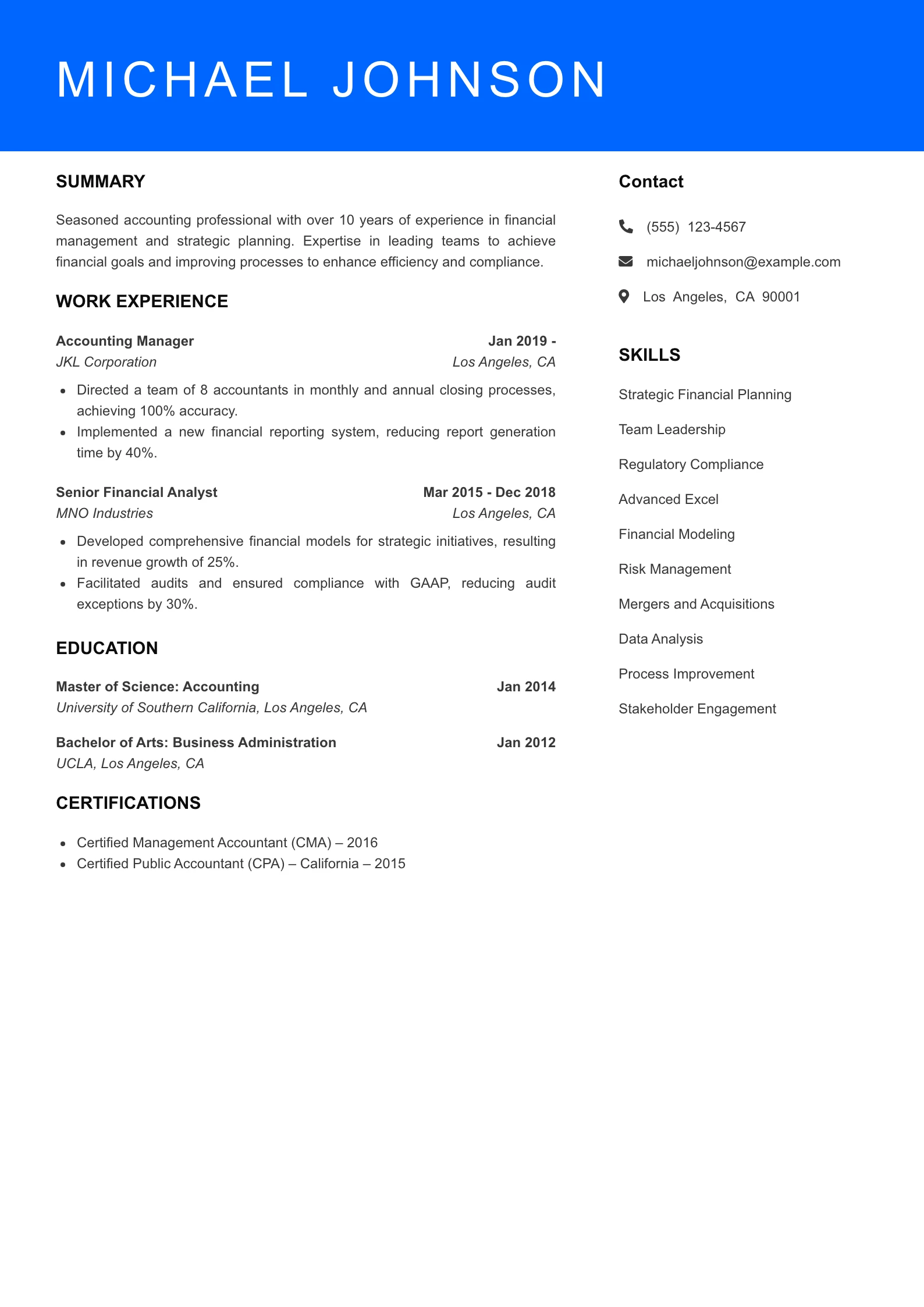
Why This Resume Works
- The summary clearly establishes Michael’s extensive experience and expertise in financial management, making it immediately relevant for roles in accounting or finance.
- A robust skill set is presented, highlighting both technical abilities (e.g., Advanced Excel, Financial Modeling) and leadership qualities (e.g., Team Leadership, Stakeholder Engagement), aligning well with senior-level expectations.
- The work history includes quantifiable achievements, showcasing Michael’s impact on revenue growth and efficiency improvements, which enhances credibility and demonstrates effectiveness in previous roles.
- The resume reflects a strong fit for mid to senior-level positions, with progressive responsibility evident through the work history and the scope of tasks managed.
- The clarity and professional tone throughout the resume ensure that key information is communicated effectively, making it easy for hiring managers to assess qualifications quickly.
How to Craft a Strong Accountant Resume
Creating a powerful resume is crucial for accountants, as it serves as a marketing tool to showcase your qualifications and abilities to potential employers. In this guide, we will break down the essential components of a strong accountant resume, providing you with valuable insights on how to effectively present your skills and experiences.
1. Summary Statement
A strong summary statement is essential for accountants because it provides a quick snapshot of your professional identity. This brief section can set the tone for your entire resume, capturing the attention of hiring managers and encouraging them to read further. An effective summary outlines your experience level, specialization within accounting, key soft skills, and relevant certifications.
When crafting your summary, aim for a confident, tailored, and result-focused tone. Avoid generic phrases and instead highlight what makes you unique as an accountant. This statement should reflect your professional ethos and your ability to deliver results in previous roles. Keep it concise—ideally 2-3 sentences that encapsulate your strengths and what you bring to the table.
Detail-oriented recent accounting graduate with comprehensive knowledge of financial principles and hands-on internship experience in tax preparation and auditing. Known for strong analytical skills and dedication to accuracy.
Mid-Level:
Results-driven accountant with over 5 years of experience in financial reporting, tax compliance, and budget management. Proven ability to streamline processes and implement effective accounting solutions, enhancing financial operations.
2. Skills & Qualifications
Core and soft skills are critical components of an accountant’s resume. Key skills often include:
- Financial analysis
- Budgeting and forecasting
- Tax preparation
- Auditing
- Attention to detail
- Time management
- Communication
- Problem-solving
To pull the right skills from job descriptions, carefully analyze the qualifications listed in postings for roles you’re interested in. Identify recurring skills and phrases, as these are likely to be keywords that pass through Applicant Tracking Systems (ATS). Tailor your skills section to align with these requirements while also including your own unique strengths.
- Financial analysis
- Budgeting and forecasting
- Tax preparation
- Auditing
- Attention to detail
- Time management
- Communication
- Problem-solving
Top ATS Keywords for Accountant
3. Work History
The work history section is the heart of your resume, where you demonstrate your professional experience and accomplishments. Focus on quantifiable achievements, such as cost savings, process improvements, or increased efficiency in past roles. Use a reverse-chronological format to showcase your most recent job first.
When listing your experiences, use bullet points to present concise, quantified statements. For example, instead of saying “responsible for financial reporting,” you might say “produced financial reports that improved decision-making speed by 30%.” This approach highlights your impact and helps potential employers understand the value you can bring.
Accounting Intern, ABC Corp, New York, NY, June 2021 – Aug 2022
– Assisted in the preparation of monthly financial statements
– Helped with tax documentation and compliance
– Conducted data entry and maintained financial records
Mid-Level:
Senior Accountant, XYZ Inc, Boston, MA, Jan 2018 – Present
– Managed financial audits, improving accuracy by 20%
– Developed budgets and forecasts, leading to a 15% reduction in expenses
– Collaborated with cross-functional teams to optimize accounting processes
4. Education
An accountant typically holds at least a bachelor’s degree in accounting or a related field. Additionally, relevant certifications such as CPA (Certified Public Accountant) or CMA (Certified Management Accountant) are highly regarded in the industry.
When formatting your degrees and certifications, use a clear structure that includes the degree, institution name, location, and graduation year. For example, “Bachelor of Science in Accounting, University of Illinois, Chicago, IL, 2020.” Be sure to list your most recent education first, and feel free to include your GPA if it is strong.
Degree, School Name, City, State, Graduation Year
Example:
BBA in Accounting, University of California, Berkeley, CA, 2019
5. Additional Sections
In addition to the core sections of your resume, consider including optional sections that can enhance your profile. These may include:
- Certifications
- Languages
- Professional awards
- Volunteer work
For certifications, a clear format is essential. For instance:
- CPA (Certified Public Accountant) – State Board of Accountancy – 2021
- CMA (Certified Management Accountant) – Institute of Management Accountants – 2022
These details not only show your qualifications but also your commitment to continuing education and professional development.
- CPA (Certified Public Accountant) – State Board of Accountancy – 2021
- CMA (Certified Management Accountant) – Institute of Management Accountants – 2022
6. Do’s and Don’ts
To ensure your accountant resume stands out, here are some practical tips:
Do:
- Tailor your resume for ATS by including relevant keywords.
- Showcase your impact with quantifiable results.
- Use industry-specific terms that resonate with hiring managers.
Don’t:
- Use generic statements that lack detail.
- Ignore the importance of soft skills, which are crucial in collaborative environments.
- Overuse buzzwords that may dilute the clarity of your message.

